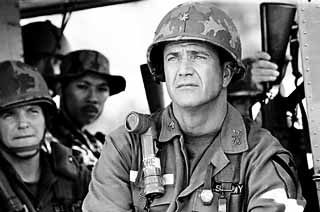This semester we learned about many different types of leadership. Some leaders are more involved in the decision process, others leave it up to the people they are in charge of, and certain leaders do a combination. But at the end of the day, a leader is the "point person" in which a lot of responsibilities land on. While there are many different ways to be a leader, there are some traits every leader must possess regardless of the job they are in. A movie I recently watched really showed me what these qualities were. They were embodied in a character named Lieutenant Colonel Hal Moore played by Mel Gibson in the Vietnam war movie We Were Soldiers. I believe his leadership can be summed up by this one quote from the movie as Moore is addressing his troops before they depart to fight:
"Look around you. In the 7th cavalry, we've got a captain from the Ukraine; another from Puerto Rico. We've got Japanese, Chinese, Blacks, Hispanics, Cherokee Indians. Jews and Gentiles. All Americans. Now here in the states, some of you in this unit may have experienced discrimination because of race or creed. But for you and me now, all that is gone. We're moving into the valley of the shadow of death, where you will watch the back of the man next to you, as he will watch yours. And you won't care what color he is, or by what name he calls God... Now let us understand the situation. We are going into battle against a tough and determined enemy.
"I can't promise you that I will bring you all home alive. But this I swear, before you and before Almighty God, that when we go into battle, I will be the first to set foot on the field, and I will be the last to step off, and I will leave no one behind. Dead or alive, we will all come home together. So help me, God."
Ability to bring unlike people together to accomplish a task: We've got Japanese, Chinese, Blacks, Hispanics, Cherokee Indians. Jews and Gentiles. All Americans. Now here in the states, some of you in this unit may have experienced discrimination because of race or creed. But for you and me now, all that is gone... you won't care what color he is, or by what name he calls God.
I like this quote a lot mainly for the first two sentences. Moore acknowledges the barriers between the soldiers immediately by showing all the nationalities, but he brings everyone together by stating they are all Americans. In a workplace, no matter where anyone comes from, they are all employees. They were all chosen to do a specific task. Leaders ought to tap into this realization to prompt collaboration rather than rivalry and individuality. This ties into the 6th habit presented in Seth Conroy's book 7 Habits of Highly Effective Teens. It suggests to synergize which means bringing people together to achieve more.
I like this quote a lot mainly for the first two sentences. Moore acknowledges the barriers between the soldiers immediately by showing all the nationalities, but he brings everyone together by stating they are all Americans. In a workplace, no matter where anyone comes from, they are all employees. They were all chosen to do a specific task. Leaders ought to tap into this realization to prompt collaboration rather than rivalry and individuality. This ties into the 6th habit presented in Seth Conroy's book 7 Habits of Highly Effective Teens. It suggests to synergize which means bringing people together to achieve more.
Making a clear goal that everyone can rally behind: Dead or alive, we will all come home together. So help me, God."
While this goal may be a little extreme and not applicable to the workplace, the idea this presents around goals is. Leaders typically the ones to make goals or finalize ones that are suggested. As long as everyone is on the same page, effectiveness within a company should increase. The second Habit from Conroy's book says to begin with the end in mind. In the movie, thinking with the end in mind means coming to terms that some people will live while some will die, but in the end the mission is to bring everyone home. Everyone in the movie wants that because they want to keep their lives. People in the workplace want goals along the lines of making more profit because their salaries might go up.
Being specific on how this goal will be accomplished: We're moving into the valley of the shadow of death, where you will watch the back of the man next to you, as he will watch yours.
This part is similar to the previous point but different in the way that it suggests ways to accomplish a goal. This has to do with being proactive, Conroy's first habit. In war, people stay alive by having someone watch their back. This helps accomplish the goal of keeping as many people alive. In the workplace, this means having a professional attitude, getting things done on time, communicating effectively with everyone on the team, and overall getting the job done. Leaders set the goals, but they are not always the ones who say how the goal will be accomplished. Talking to my mom, a leader in her job, she likes to give people below her goals (i.e set up a development day and bring in speakers to talk about such and such) and give them the freedom to accomplish that goal as they wish. As long as the goal is accomplished and no harm is done to the company, she will be happy. Another style of leadership is telling someone to accomplish a goal in a very specific manner (i.e set up a development day on this Friday with this speaker and talk about such and such) and expect that to be done in that way. This depends on the competency of the employees, the goal that needs to be accomplished, and the situation surrounding a desired goal.
This part is similar to the previous point but different in the way that it suggests ways to accomplish a goal. This has to do with being proactive, Conroy's first habit. In war, people stay alive by having someone watch their back. This helps accomplish the goal of keeping as many people alive. In the workplace, this means having a professional attitude, getting things done on time, communicating effectively with everyone on the team, and overall getting the job done. Leaders set the goals, but they are not always the ones who say how the goal will be accomplished. Talking to my mom, a leader in her job, she likes to give people below her goals (i.e set up a development day and bring in speakers to talk about such and such) and give them the freedom to accomplish that goal as they wish. As long as the goal is accomplished and no harm is done to the company, she will be happy. Another style of leadership is telling someone to accomplish a goal in a very specific manner (i.e set up a development day on this Friday with this speaker and talk about such and such) and expect that to be done in that way. This depends on the competency of the employees, the goal that needs to be accomplished, and the situation surrounding a desired goal.
Being honest with employees about the difficulties that might arise: We're moving into the valley of the shadow of death... I can't promise you that I will bring you all home alive.
Honesty is very important to leadership. Having the trust of your employees and all that are under you will serve you better in the long run. People will want to work for you more if your word is golden. Being honest is not only with what you say but also how you listen to others. Habit 5 says to listen to people sincerely. No one wants to hear that they are going into the "valley of the shadow of death" or that the company had a 10% drop in profit over the course of a year, but if it happens it needs to be said so everyone is on the same page. If people aren't informed, I believe it will only go down a bad path.
Honesty is very important to leadership. Having the trust of your employees and all that are under you will serve you better in the long run. People will want to work for you more if your word is golden. Being honest is not only with what you say but also how you listen to others. Habit 5 says to listen to people sincerely. No one wants to hear that they are going into the "valley of the shadow of death" or that the company had a 10% drop in profit over the course of a year, but if it happens it needs to be said so everyone is on the same page. If people aren't informed, I believe it will only go down a bad path.
Being the one to initiate and own the process: I will be the first to set foot on the field, and I will be the last to step off, and I will leave no one behind.
This final quote is one that stuck out to me. I would guess that many leaders don't think that they should be the ones to be first to start initiate something all the time. I think this idea is what makes this whole quote from the movie unique: the leader is the one on the front line. They take responsibility and ownership for the company and other employees. This partially has to do with the first habit but also the third habit which means to put first things first. A leader is the point guy and should be the one to start everything.
Overall, a leader should be the one to lead by example. While there is many types of leadership, I believe this are core ideas that each true leader should posses.







No comments:
Post a Comment